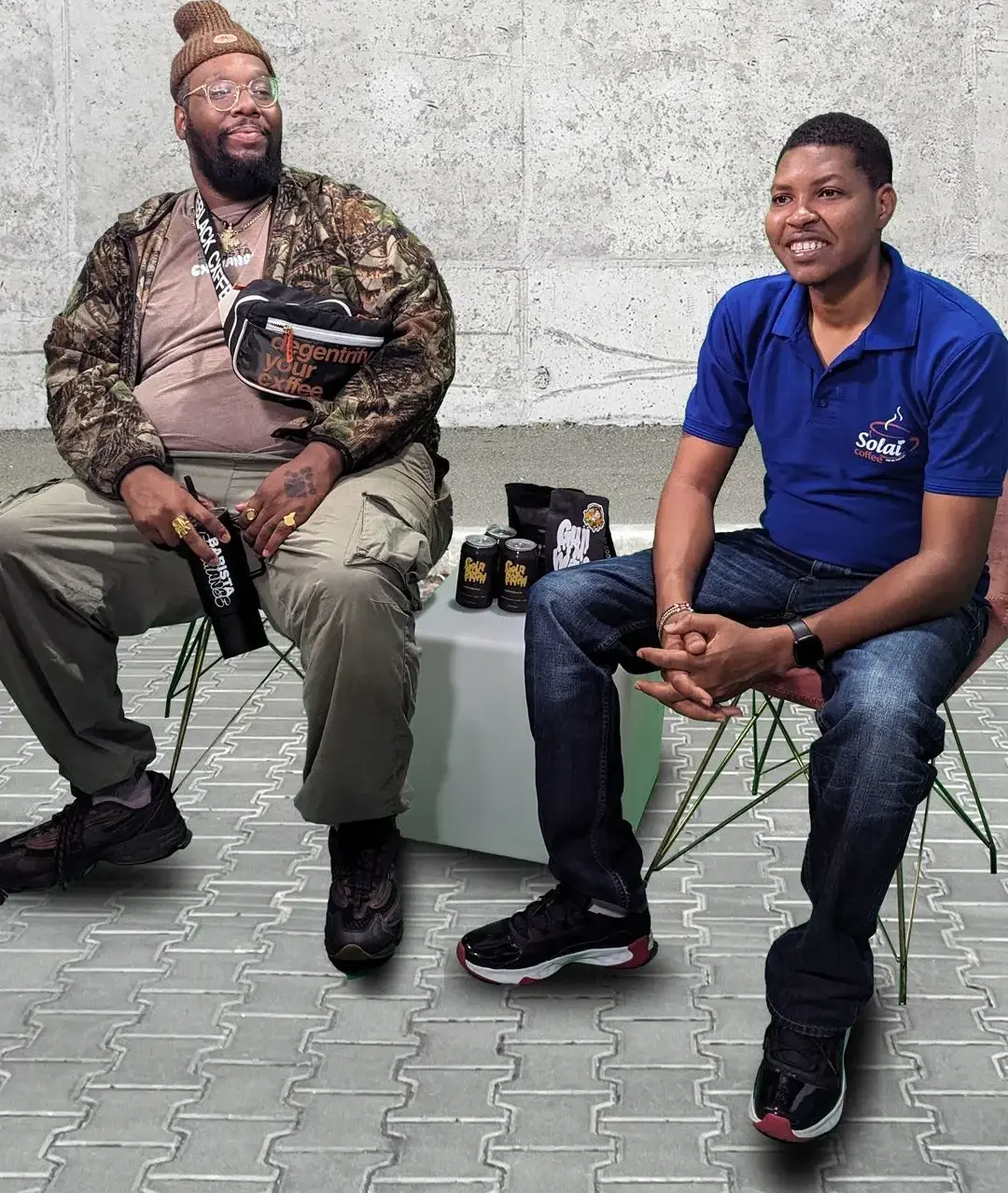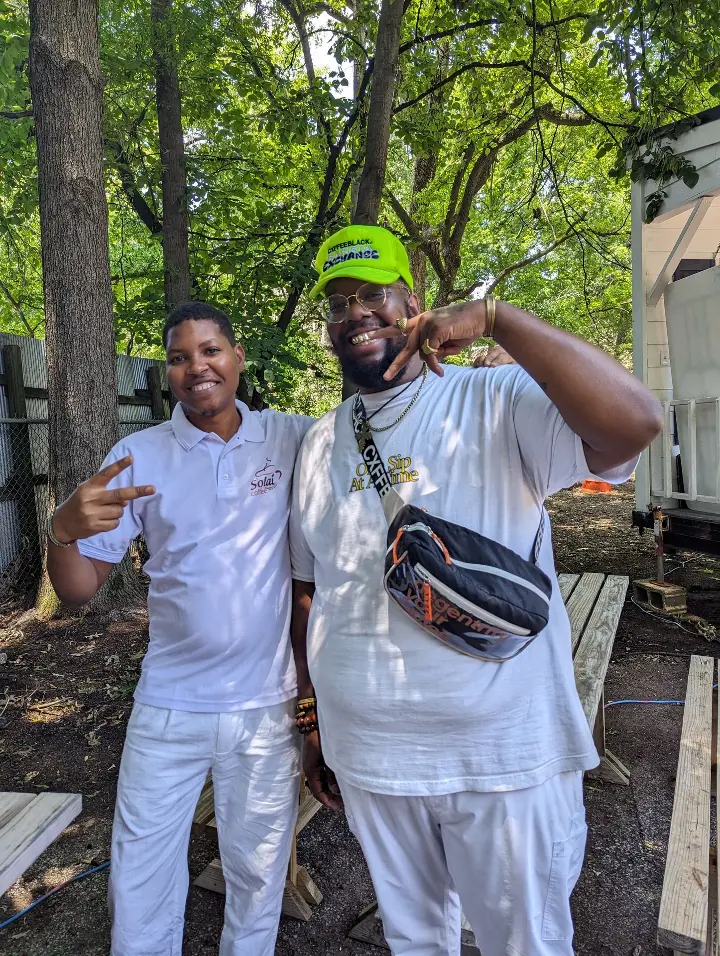In a recent podcast episode, Bartholomew Jones of Cxffee Black and Peter Kuria of Solai Coffee delved into the transformative power of coffee. The recording took place at Unapologetic Studios in Memphis, Tennessee, shortly after the grand opening of Coffee Black HQ's new space. Memphis, known for its rich civil rights history, provides a poignant backdrop for their discussion on the intersection of coffee, heritage, and justice.

Who They Are and Where They Come From
Peter Kuria and Bartholomew Jones begin by introducing themselves, setting the stage for a conversation deeply rooted in personal experiences with coffee. Peter, who traveled from Florida, shared his reflections on the Civil Rights Museum and the vibrant culture of Memphis. For him, Memphis symbolizes resilience and transformation, mirroring his journey in the coffee industry. Bartholomew highlighted their partnership in sourcing coffee from Kenya through Peter's family-owned importing and exporting company.
Peter's connection to coffee is deeply personal.
"Coffee has always been a part of my life," Peter shared. "I was born into a family where coffee wasn't just a livelihood; it was our way of life."
Peter's father planted the first coffee seeds in 1983, shaping Peter's early memories and setting the stage for his career in coffee. "I remember picking coffee cherries at a young age. Initially, it was hard work that I resisted, but over time, I came to appreciate the lessons it taught me." Though small-scale by Kenyan standards, the family's farm played a vital role in their community and influenced Peter's path.
Reflecting on his childhood in Memphis, Bartholomew drew parallels to Peter's experiences. "I had similar experiences working on my grandfather's farm. Though I didn't always enjoy it, those experiences shaped my connection to the land and coffee."
Their Journey Into the Specialty Coffee Business
Peter's journey into the specialty coffee business continued his family's legacy. His parents began cultivating coffee in 1983, and as Peter grew older, he witnessed the farm's expansion and the challenges it faced. Moving to the U.S., Peter initially worked in corporate roles to support the farm back home. A turning point came in 2018 when a devastating dam burst in his community, leading Peter to realize coffee's potential for rebuilding and sustaining his community.
"When the dam burst, it was a moment of devastation. But it also made me realize the power of coffee to sustain us economically and bring our community together." – Peter Kuria.
Bartholomew, too, has a personal connection to the land and coffee. He draws parallels between his family's sharecropping history and the exploitative systems faced by Kenyan coffee farmers. He sees their work as part of a broader movement to address these injustices and reclaim their heritage.
"Reclaiming coffee isn't just about preserving culture; it's about creating sustainable economic opportunities for our communities." – Bartholomew Jones.
Barriers to Entry in Specialty Coffee
The conversation shifts to the significant barriers Peter and Bartholomew faced while entering the specialty coffee business.
- Legal and Financial Challenges: Both speakers reflect on the legal and financial obstacles they encountered, particularly in Memphis.
- Systemic Issues: They discuss systemic problems in the coffee industry, including market fluctuations and gatekeepers who restrict direct trade.
Peter emphasized the importance of educating consumers:
"We want people to make informed, ethical purchasing decisions. Understanding the story behind their coffee can empower them to support fair practices."
Challenges in Coffee Production
Peter and Bartholomew explore the complex coffee production process in Kenya, shedding light on the injustices faced by small-scale farmers. Private entities often control the value chain, exploiting farmers through price-fixing and charging for services like dry milling and marketing.
Bartholomew draws a parallel to his family's experience with sharecropping.
"Sharecropping, in many ways, mirrors the exploitation we see today in the coffee industry. The systemic issues and power imbalances are deeply ingrained," he noted.
They highlight the key challenges:
- Economic Injustice: Farmers receive only a fraction of what consumers pay for coffee abroad. "Farmers are at the mercy of intermediaries who take the lion's share of profits," Peter remarked.
- Generational Trauma and Land Ownership Issues: Bartholomew pointed to colonial restrictions that created a cultural detachment from coffee in Kenya. "Generational trauma has distanced African youth from the land and its economic potential. We must address these injustices to reclaim coffee for our communities."
- Market Challenges and Export Barriers: Fluctuating market prices and restrictive export systems often hinder farmers from achieving fair product prices.
Learn More About Solai Coffee’s Direct Trade Practices
Reclaiming Coffee for the Future
Peter and Bartholomew envision a future where coffee serves as a means of empowerment and cultural reclamation.
- Consumer Education: Peter stresses the importance of educating consumers to make ethical purchasing decisions. "Understanding where their coffee comes from can empower consumers to support fair practices," he said.
- Cultural Reconnection: Bartholomew advocates reconnecting African youth with their roots and land. "Our work is about reconnecting with our roots and creating sustainable economic opportunities," he added.
- Innovative Initiatives: They discussed plans to integrate coffee into cultural practices, including the song "Gold on Me" and establishing a coffee center of excellence in Kenya, including a barista training school to empower the next generation of coffee professionals.
In addition, Cxffee Black is running The Black Barista Exchange Program, an innovative initiative seeking to partner with four young baristas from across the African continent and bring them to the Anti-Gentrification Coffee Club. This exchange program aims to foster cultural exchange, provide advanced barista training, and build a network of African baristas to strengthen the global presence of African coffee professionals.

The Role of Art and Community
Bartholomew emphasized the role of art and music in reshaping cultural narratives.
"Art and music unite people and deepen their connection to their heritage," he said.
Peter echoed these sentiments, sharing his visit to the African American Coffee Community Center (AGCC) in Memphis:
"The sense of belonging at AGCC reaffirmed my belief in the power of community-driven initiatives to effect meaningful change."
Economic Justice and Community Empowerment
Peter and Bartholomew passionately discussed the need for economic justice and community empowerment in the specialty coffee industry. Small-scale farmers often receive minimal profits despite their hard work. Both highlighted the necessity of addressing these disparities to create a sustainable future for African coffee producers.
Bartholomew reflected on his experiences at the African Coffee Conference, emphasizing the potential of African coffee farmers to define their specialty within the global market.
Innovating for a Sustainable Future
Innovation is crucial in transforming the coffee industry. Peter and Bartholomew stress the need to create new flavors and products that reflect their community's culture. Drawing a parallel to hip-hop's evolution, they suggest that similar innovations can revitalize the coffee industry.
"Just as hip-hop became a cultural force, we can transform the coffee industry through innovation and inclusivity." – Peter Kuria.
They hope to build a thriving future for African coffee by integrating sustainable practices, fair compensation, and cultural advocacy.
In Conclusion
Peter and Bartholomew's conversation illuminates the powerful intersection of coffee, heritage, and justice. Their efforts to reconnect with cultural roots, address historical injustices, and foster innovation in the industry offer a hopeful vision for the future.
Through their work, they aim to create a more inclusive and equitable coffee industry for African coffee producers, driven by community empowerment and economic justice.
Centering the voices of farmers and promoting sustainable practices, they hope to reshape the global coffee landscape and ensure that African communities benefit from the fruits of their labor, both culturally and economically.
Ready to Make a Difference?
Discover how your coffee choices can empower African communities. Shop our ethically sourced beans, grown with care and commitment to sustainability. With every cup of Solai Coffee, you support farmers and build a more just coffee industry.
Coffee, Heritage, and Justice: A Conversation with Peter and Bartholomew